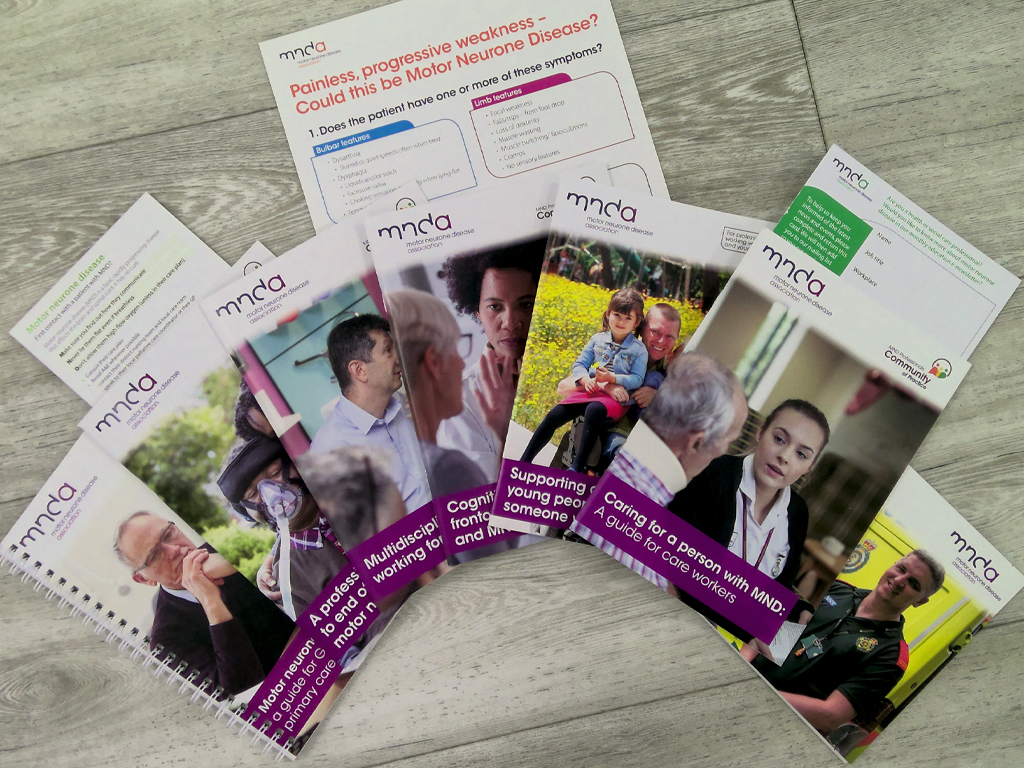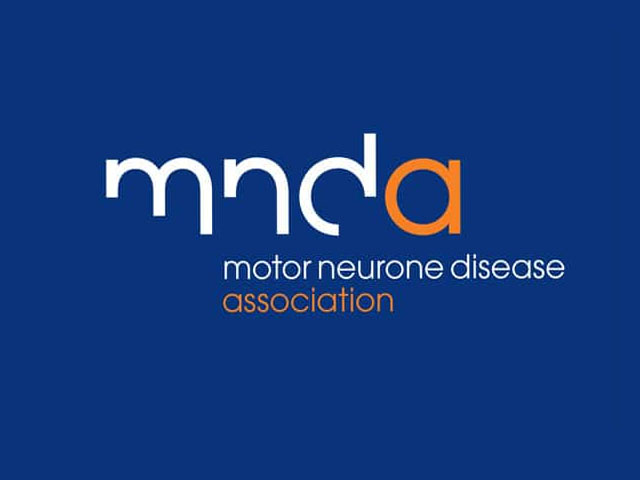
This information is for health and social care professionals.
Because MND can be rapidly progressive, it is important that people with the condition are offered referral to specialist palliative care services at an appropriate time.
People with MND should also be encouraged to talk through options for their care and their preferences for end of life, before the need is urgent or before they find it too difficult or tiring to communicate.
Download our full end of life guide for professionals
View our end of life training video
View our information on planning ahead for people with or affected by MND
Looking for all our resources for a specific profession or topic, for you and the people you support?
Use our Professional Information Finder
Preparing for end of life
Palliative care for MND
Palliative care is active holistic care of people with advanced progressive illness. It involves:
- management of pain and other symptoms
- psychological support
- social support
- spiritual support.
The aim of palliative care is to achieve best quality of life for people and their families.
People with MND have particularly complex care and support needs in the final stages of life. Because MND can be rapidly progressive, it is important that people with the condition are offered referral to specialist palliative care services at an appropriate time.
The appropriate time for referral will vary, depending on factors such as the availability of local MND care centre or network services and the speed of progression of symptoms.
Establishing early links with palliative care and specialist services can provide a useful source of support. However, introducing the concept of palliative care can present some difficulties, because of the stigma and lack of understanding around what palliative care is and what it can provide.
Key Points for professionals:
- Explain the role of the palliative care team and the potential benefits.
- Introduce the service via day care, respite or complementary therapies.
- If palliative care includes referral to a hospice, stress that this doesn’t mean that death is imminent, as many people view hospices purely as places where people die.
- Discussing advance care planning ensures that the patient’s wishes are respected at each stage of the disease.
- All people with MND should be placed on local palliative care registers/lists/co-ordination systems, where these exist – eg the Gold Standards Framework, Electronic Palliative Care Co-ordination Systems (EPaCCS). This will ensure that future care can be planned and coordinated.
Planning ahead for end of life
People with MND should be encouraged to talk through options for their care and preferences for end of life with their GP or an appropriate member of their specialist team, before the need is urgent or before they find it too difficult or tiring to communicate.
Having time to think things through and knowing that wishes have been recorded in an advance care plan gives many people peace of mind.
All professionals involved in the care of the person with MND should be aware of any decisions that have been made and any changes made to these.
Marie Curie has more information and guidance about planning ahead on the website and in print, including a step-by-step checklist that may be helpful. They also have more information specifically for healthcare professionals on planning ahead.
Advance care planning
If discussions are held and decisions made around preferences for end of life, ideally they should be brought together in a personalised advance care plan.
An advance care plan can be wide-ranging, covering all aspects of day-to-day care including, as examples, who should provide personal care and how they should do it, special requirements for food and drink, decisions about artificial feeding, ventilation, resuscitation, use of antibiotics, place of care and preferred place of death, and other issues such as care of dependants or pets in an emergency.
Also included in this may be leaving special messages for friends and loved ones, and memory boxes or books for children.
The process for advance care planning, the documentation used and who needs to have this documentation will vary between areas. Many places will have end of life care coordinators or facilitators.
Advance statements
Usually included in or with an advance care plan, an advance statement is a written statement of a person’s preferences, wishes, beliefs and values for future management, medical choices and care. It can cover any aspect of health and social care, including where the person would like to be cared for and where they would prefer to die. It is designed to guide anyone who may have to make treatment and management decisions if the person has lost the capacity to make or communicate their own decisions.
Even though advance care plans and advance statements are not legally binding, they still guide on advance decisions. Health professionals should take the recorded preferences into account as part of an overall judgement of best interests, and they should be honoured where possible.
Advance Decision to Refuse Treatment (ADRT)
Sometimes referred to as an Advance Decision, this is a decision that can be made in advance to refuse specific treatments (including those that may sustain life) in certain circumstances in future.
Before making an ADRT, the person should discuss the contents with an appropriate professional – usually the GP, specialist nurse or neurologist – to ensure they are clear about which treatments they wish to decline and that all treatments being refused are named.
The person with MND should have a full understanding of the possibility of discomfort and risk to their life. An ADRT cannot authorise a doctor to do anything illegal, such as euthanasia, but it can enable someone to refuse something that prolongs their life (eg artificial feeding or antibiotics). The person will still have the right to primary care and comfort.
The ADRT is not valid unless the person has lost the ability to make decisions or communicate. Every opportunity should be given to help the person to communicate, for example by blinking. An ADRT is legally binding. It should be regularly reviewed in case the person changes their mind. See the NHS guide for professionals on ADRT, or the MND Association’s End of life guide for people with MND.
Do Not Attempt CPR (DNACPR)
Cardiopulmonary resuscitation (CPR) is the procedure used to try to restart the heart or breathing when it stops. A person can record a wish for Do Not Attempt CPR (DNACPR). This is not legally binding but in most cases an appropriate healthcare professional will make a judgement depending on the circumstances.
In England and Wales, someone can include a DNACPR in their ADRT, which is legally binding. All relevant professionals, including the ambulance and out-of-hours service, should be aware of the DNACPR. It will be valid in the person’s home, hospital and other care settings.
Reviewing choices
Any decisions made about advance care should be regularly reviewed, to reflect that people do change their minds. This can be difficult when someone’s condition advances, as problems with communication can make it more problematic to identify any changes in wishes. If changes are made, new copies should be signed and dated and distributed to those who hold the existing paperwork.
End of life care
Managing symptoms
Early and sustained good symptom control is essential in the management of a peaceful and dignified death.
Professionals should check:
- pain – patients may experience severe discomfort and/or distress, particularly in the later stages. Opioid analgesics may be an option. Careful titration will avoid excessive drowsiness and respiratory depression
- pressure care
- dyspnoea
- dysphagia
- salivation
- insomnia
- anxiety/depression
- restlessness/agitation
- bowels and bladder
- emotional and practical needs of the carer and family.
The GP, specialist or other appropriate prescriber should consider anticipatory prescribing of a range of medications to address worsening symptoms, including:
- antimuscarinics to reduce saliva and respiratory secretions
- opioids and benzodiazepines, such as midazolam, to manage breathlessness that is exacerbated by anxiety, and other medications to reduce anxiety/terminal restlessness, such as haloperidol or levomepromazine
- anti-emetics for nausea.
Regular analgesics should usually be continued until death, even if oral medication is no longer possible because of dysphagia.
Alternatives, such as suppositories or parenteral routes should be considered. Parenteral medication may be given as a continuous subcutaneous infusion using a syringe pump.
Eating and drinking
Most people stop eating and drinking in the final days of life. The end of life care team will advise on hydration by mouth or feeding tube.
Mouth care
In the final days of life, mouth breathing and minimal fluid intake can cause the mouth to become dry and the lips become more likely to crack. The mouth should be kept clean and moist: some people find ice lollies refreshing.
Terminal restlessness
This is the name given to agitation that is sometimes seen in people just before death, and is usually associated with a reduced level of consciousness. A person may appear unconscious, restless and unsettled. There may be disorientation, anxiety, fidgeting and the person may look scared or distressed. It can happen now and again or all the time.
Communicating with the person with MND
This may become extremely difficult as the person with MND reaches end of life, but even if they are unresponsive, every attempt should be made to maintain communication. Eye movements and single response answers to closed questions may be used, or picture/alphabet boards or other communication aids where appropriate.
Supporting family and carers
MND is unpredictable and may progress rapidly, with death occurring more quickly than anticipated. Carers and family members will need practical and emotional support. Care plans and information must be shared by all members of the care team and adequate nursing cover maintained.
Taking time to discuss end of life with the family as early as possible can be positive, as it allows them to look at their lives together, achieve things that are important to them and tie up loose ends.
Starting conversations about planning ahead may be difficult for the person with MND, and their families and carers. But it is an important step than can help them to feel more in control. Marie Curie has specific information about how you can support friends, family and carers on their website.
Page last updated: July 2023
Next review: July 2025


